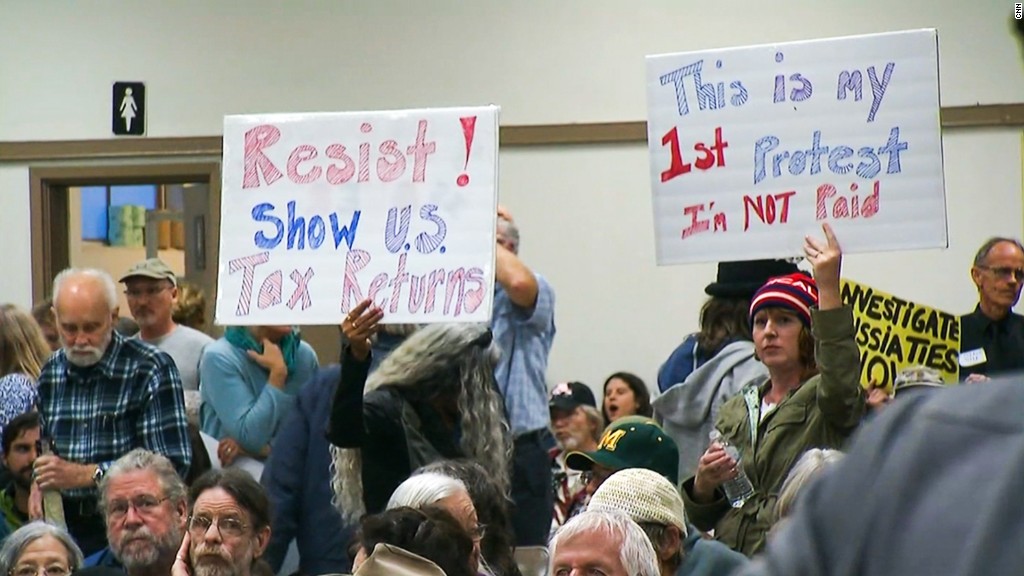
Normally by the end of tax filing season, the sitting U.S. president publicly releases his tax return for the prior year.
There's no expectation, however, that President Trump will do so. He's already flouted a 40-year tradition of presidential nominees releasing their tax returns, and there's been no indication since he took office that he'll start conforming now.
By law he is not required to release his tax returns.
But given his international business empire and -- until recently -- his unwillingness to be critical of Russia, Democrats and a small handful of Republicans have supported efforts to require him to release his returns or to pressure Congressional leaders to exercise their authority to obtain them legally.
The public has been vocal as well. This weekend there will be more than 150 marches across 48 states and the District of Columbia to demand Trump release his returns.
Among their concerns: the president's foreign ties could pose a national security risk and his potential conflicts of interest might violate the Emoluments Clause of the Constitution.
Without his returns, "Americans cannot know whether Mr. Trump is using the presidency to enrich himself and potentially empower our enemies," Sen. Ron Wyden, the top Democrat on the Senate Finance Committee, wrote in a recent opinion piece.
If Trump's returns were ever released -- how much the public would learn depends on what parts of his returns come out. For instance, the top two pages alone won't reveal his foreign ties. Even his full return -- including schedules and attached forms -- may not definitively resolve concerns about his foreign business relationships. But they could point to other information -- such as who else invests in his partnerships -- that could help answer questions.
That said, however, plenty of other details about his tax situation would be revealed, such as:
How much income he made: The top two pages of his federal Form 1040 would reveal Trump's income from general sources (salary, business income, investment income, rental income, etc.)
What he claimed in deductions: Trump's return would indicate how much he claimed in itemized deductions. More specifically on Schedule A and Form 8283, he would report how much money he donated to charity and which charities he chose.
Related: Democrats vow to keep pushing for Trump's tax returns
His charitable giving is an area he bragged about during the campaign, even though a Pulitzer Prize-winning Washington Post report did not find proof in most instances of the donations Trump said he made.
How much he paid in taxes: The president has often bragged about paying as little tax as possible while at the same time boasting of his great wealth. That's raised concerns that the tax code may allow some of the very richest Americans to pay very little.
Whether and where he has foreign bank accounts: On Schedule B and related Form 8938, the public would learn what foreign accounts and trusts Trump has and in which countries.
Whether he paid taxes to foreign governments: If Trump claims a foreign tax credit, that means he paid tax to a foreign government and that would be subtracted from his U.S. income tax liability. On Form 1116 he'd have to reveal the countries where he paid those taxes and the type of income on which those taxes were due.
His businesses' profits and losses: Schedule C would detail the profits, losses and expenses of Trump's individual business entities. Schedule K would show his or his entities' share of profits, losses and liabilities in the various partnerships in which Trump has a stake. That same schedule would also list the locations of those partnerships.
Also, on those forms he must declare whether he "materially participated" in a given business. In cases where he did, he could really reduce his tax bill because he'd be allowed to use losses from that business to offset taxable profits from other businesses or investments, said tax lawyer Steven Rosenthal, a senior fellow at the Tax Policy Center.
Whether he'd benefit from his own tax reform proposals: The Trump administration has indicated it is working on a new tax reform plan. If and when that new plan is ever released, having the president's more recent tax returns would offer a good indication of whether he'd benefit from his own proposals.


